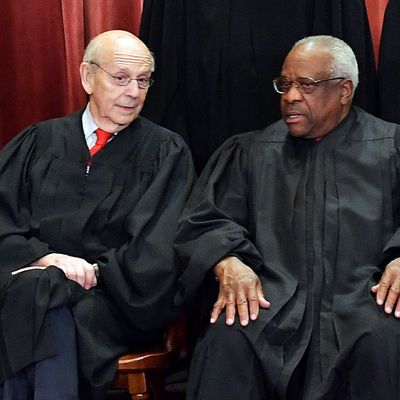
Normally a dissenting opinion in a Supreme Court decision involving sovereign immunity would get about as much attention as a gnat’s sneeze. But a dissent from the normally mild-mannered Justice Stephen Breyer published today in Franchise Tax Board of California v. Hyatt is echoing around both legal and political circles. Prompted by the majority’s blithe willingness to flatly reverse a Supreme Court precedent (Nevada v. Hall), Breyer warned bigger and badder reversals might soon be on the way:
It is one thing to overrule a case when it “def[ies] practical workability,” when “related principles of law have so far developed as to have left the old rule no more than a remnant of abandoned doctrine,” or when “facts have so changed, or come to be seen so differently, as to have
robbed the old rule of significant application or justification.”
It is far more dangerous to overrule a decision only because
five Members of a later Court come to agree with earlier dissenters
on a difficult legal question. The majority has surrendered to
the temptation to overrule Hall even though it is a well-
reasoned decision that has caused no serious practical
problems in the four decades since we decided it. Today’s
decision can only cause one to wonder which cases the Court will overrule next.
That’s a pretty broad hint. And it may have been prompted by the fact that the majority opinion in Hyatt was written by Clarence Thomas, who is by far the Court’s most hostile justice when it comes to the specific precedent of abortion rights set by Roe v. Wade and confirmed and modified by Planned Parenthood v. Casey. Indeed, Thomas once called Roe “notoriously incorrect.”
That makes this language from Thomas today potentially ominous:
Nevada v. Hall is contrary to our constitutional design and the understanding of sovereign immunity shared by the States that ratified the Constitution. Stare decisis does not compel continued adherence to this erroneous precedent. We therefore overrule Hall and hold that States retain their sovereign immunity from private suits brought in the courts of other States.
Justices Roberts, Alito, Gorsuch, and Kavanaugh concurred with Thomas’s opinion.
There are no abortion cases currently on the Supreme Court’s docket, but there is an entire smorgasbord of recently enacted state laws that are almost certainly unconstitutional under existing precedents — some of which are bouncing around lower courts — that could get to SCOTUS before too terribly long. Indeed, a conservative SCOTUS majority could choose the case best tailored to the action it wants to take on this subject.
But if Breyer’s warning is fully justified, then Court conservatives may not bother with any face-saving slow walk toward the abandonment of a woman’s constitutional right to an abortion. The beginning of the recriminalization of abortion could arrive, to borrow a Biblical expression, like a thief in the night.






























